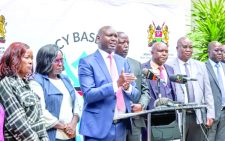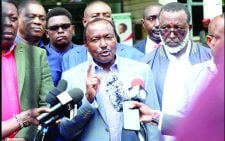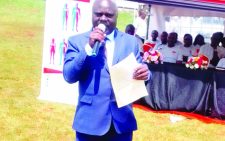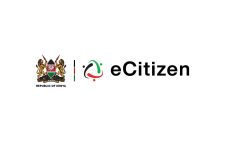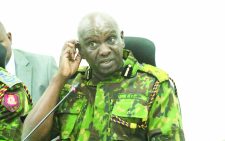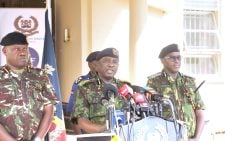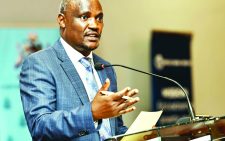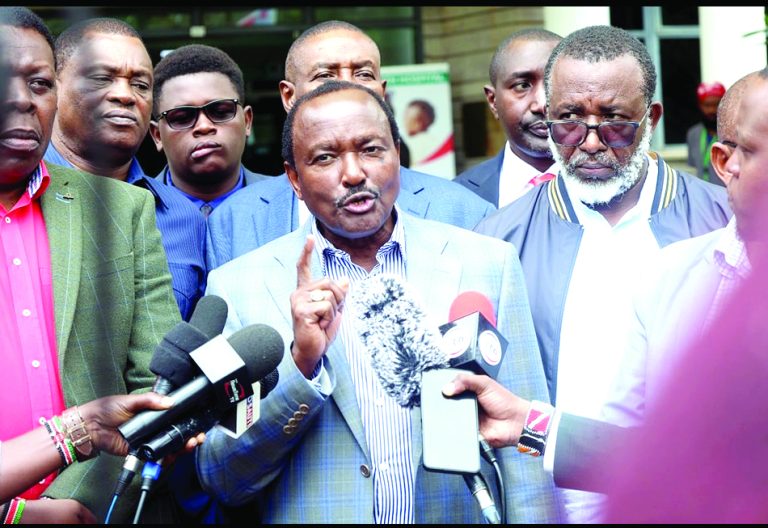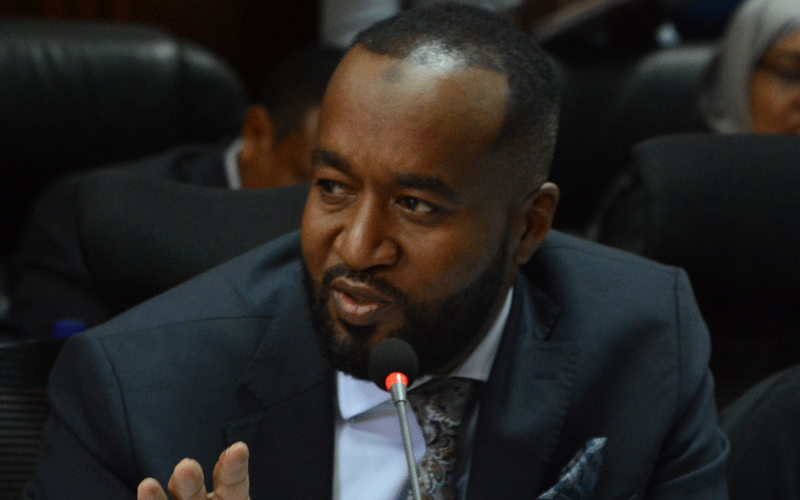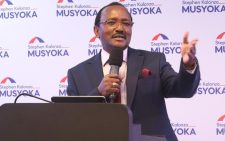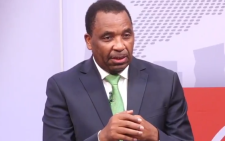How Raila run for AU post will alter Kenyan politics
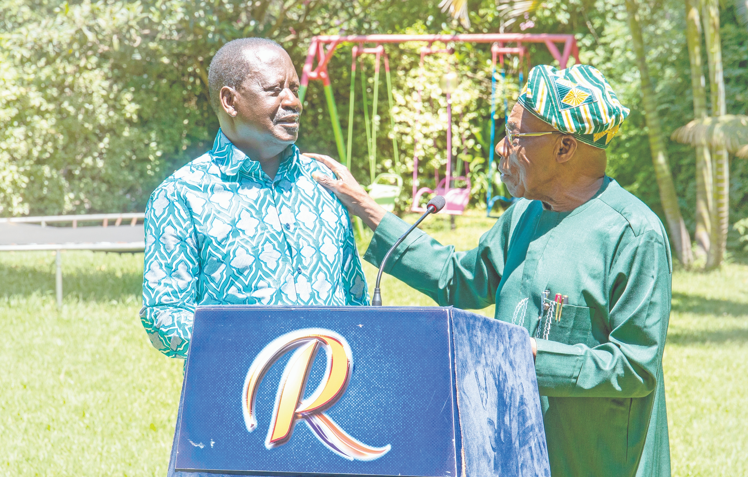
Opposition leader Raila Odinga’s decision to contest the African Union Commission (AUC) chairperson position next year has thrown into serious doubt his 2027 presidential bid as well as his support for fellow Azimio la Umoja presidential hopefuls.
Raila who has been in opposition politics for more than two decades could be forced to exit the local political stage should he be elected the AU Commission chair for a four-year term.
Being a full time executive job, Raila will be pushed out of local political activities for the new role in Addis Ababa, the AU headquarters.
This means that should he clinch the position, the country’s political arena will now be left to President William Ruto, Wiper boss Kalonzo Musyoka and second-tier political players who have also declared their interest in State House, including former Cabinet Secretary Eugene Wamalwa and Narc Kenya leader Martha Karua.
The Azimio leaders are hoping to inherit Raila’s vast constituency and networks as well as secure his endorsement for the presidency in 2027.
Flanked by Obasanjo
Yesterday, at his Karen residence while flanked by former Nigerian President Olusegun Obasanjo, Raila declared that he was ready to serve Africa as the chairman of the AU commission.
“I am inclined to accept the challenge and I am ready and I offer myself to be of service. I have asked my friend (Obasanjo) to continue to be a good ambassador and talk to other people,” said Raila. Raila revealed that he has been consulting widely among friends on whether to take the powerful job. Obasanjo is a long-time friend of the Odinga family who has hardly disguised is support for Raila political ambitions.
“The general Olusegun Obasanjo has said he is one of my closest friends on the continent and has intimated that should there be an interest, I will be keen to serve the continent of Africa,” he said.
The Azimio leader made the revelation as President William Ruto heads to Addis Ababa this evening for an AU Head of State and government summit at the weekend.
Key members of the Ruto administration including Chief Cabinet Secretary Musalia Mudavadi have hinted that the government was behind the Raila AU job campaign.
Obasanjo while hailing Raila as a Pan-Africanist said the AUC is looking for the right person to take over from current chair Moussa Faki Mahamat from Chad.
“There is much more that is wrong with Africa today. In my part of the continent, West Africa is riddled with governments that were not installed through constitutional means. The area is riddled with insecurity, poverty, unemployment and you can say a similar thing for this part of Africa,” he said.
Special envoy
The former Nigerian leader, who is also an AU Special Envoy, said the continent’s leaders need to get the commission to where it should be.
“In less than a year, there should be a change of baton at the AU top level. Maybe some of us should take it upon ourselves to assist our incumbent leaders to make sure the right person takes over. We need to look and search and advice,” said Obasanjo.
According to Obasanjo, the person to take over at AU should be a man or woman who has experience in leadership, understands the situation Africa is in and comes from a background that can make a difference.
Raila has had a long-standing commitment to Pan-Africanism and has consistently advocated for greater unity and cooperation among African nations as well as having extensive political experience to the table having served as Kenya’s Prime Minister. Raila has also served as the AU’s special envoy for Infrastructural development as well held various Cabinet portfolios in both the Moi and Kibaki cabinets. Already, Raila’s candidacy for the AU chairman has garnered support from various African leaders, civil society organizations and grassroot movements.
Afrcan support
Raila can bank on support from his contemporaries who were opposition leaders in their respective countries before ascending to the presidency like Hakainde Hichilema (Zambia), Allasane Outarra (Ivory Coast), Felix Tshisekedi (DRC) and friends such as Cyril Ramaphosa (South Africa).
The AU settled on Raila to broker, albeit unsuccessfully, a post-election crisis in the Ivory Coast pitting the then incumbent Laurent Gbagbo and Outarra in 2011. His role as the African Union on envoy and consistency on the Pan-African agenda might come in handy for Raila.
Another factor that may hugely work in Raila’s favour is the matter of regional balance, with West Africa producing the first holder of the position in former Mali President Alpha Konare (Mali), followed by Central Africa which produced Jean Ping (Gabon), Southern Africa which had Nkosazana Zuma and lately Moussa Faki (Chad) which is viewed as an extension of North Africa.
The Eastern Africa region’s attempt to field a candidate during the last election through Amina Mohamed flopped after she lost to Faki after seven rounds of voting meaning it remains the only region yet to hold the position. It noteworthy that it will require President Ruto to nominate Raila, table his name as a candidate as well as rally support for him among AU member states in the election.
People Daily has established that Raila intends to use his close associates to push for his candidacy for the AU Commission chairperson’s position in the January polls.
Raila’s deputy in the Orange party and former Kakamega Governor Wycliff Oparanya termed the AU Chairmanship job an international calling that benefits Raila’s stature as a pan-Africanist.
Oparanya welcomed proposals by President Ruto to nominate Raila for the job, saying that was not a bad idea, but hoped that he would not be gagged to quit active politics or play an active advisory role to the Opposition.
“The idea is good and welcome. Let us wait and see how things will progress,’’ he said in an interview, saying Raila was still a formidable force in the local political arena to be overlooked..
Mudavadi was the first to hint at the unfolding political truce and developments when he visited Siaya recently.
Machakos Deputy Governor Francis Mwangangi, who is currently pursuing his PhD in international relations, says Kenya’s inability to secure influential positions within international organizations has had significant implications.
“These roles provide a platform for countries to influence global agendas, shape policies, and contribute to decision-making processes,” he said.
He went on: “By not having a strong presence in key UN and AU agencies, Kenya may find itself, though a regional hegemony, at a disadvantage when it comes to advancing its national interests and participating in critical discussions on global, continental, and regional affairs.”
